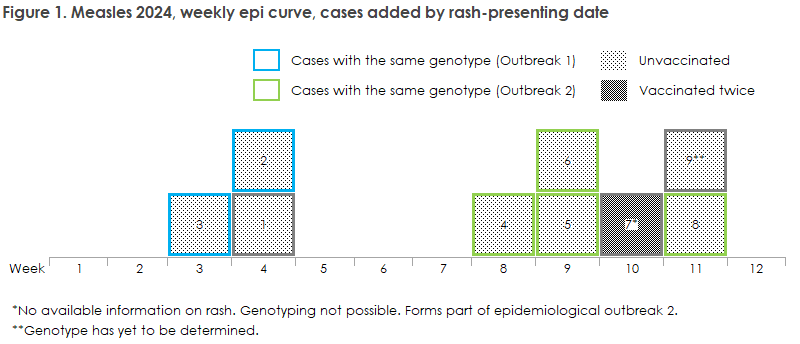No 11/12a - 2024
Four new measles cases detected in the Central Denmark Region
Four new measles cases detected in the Central Denmark Region
Last week (11), the Department of Clinical Microbiology at Aarhus University Hospital detected two new measles cases in two adults residing in the Central Denmark Region. Two weeks ago (10), another two cases were detected in the same region; one paediatric and one adult case.
One of the two most recent cases have no known contact to the other measles cases and no current travel activity, whereas the other patient has known contact to a localisation where a measles case was detected in week 10. However, the SSI’s testing, i.e. genotyping of measles virus detected from the cases of the current outbreak in the Central Denmark Region, has shown that all genotyped cases are related as they were all affected by the same variant of genotype D8. In one patient, genotyping was not possible, but the patient has known contact to some of the other patients of the outbreak. The SSI awaits virus genotyping of one case, who also has known contact to some of the remaining infected patients.
One of the two initial cases, described in EPI-NEWS no. 9/2024, was assessed to be travel related, and therefore the current outbreak is due to local transmission after infection was introduced from abroad.
Overall, the SSI therefore assesses that the current small measles outbreak in the Central Denmark Region started following travelling abroad, in connection with which the infection was introduced and then spread in the local community. The current outbreak has recorded a total of six confirmed cases. In Denmark, 2024 has so far seen a total of nine confirmed cases, see Figure 1. According to the information provided, most of the patients of the outbreak are unvaccinated.

Physicians are encouraged to remain extra attentive to the measles diagnosis in weeks to come, particularly in the Central Denmark Region, EPI-NEWS no. 7-8/2024.
The Danish Patient Safety Authority has been informed of all the cases and has initiated and ensured infection tracing measures in relation to the contacts of the infected persons, privately along with any healthcare contacts who may have been exposed to infection before the infected persons were diagnosed.
It is important that any person who is suspected of having measles avoids being in waiting rooms with other patients as measles are extremely infectious.
For more information about sampling, vaccination, post-exposure prophylaxis and notification, please see EPI-NEWS no. 9/2024.
(M. Kragh Thomsen, DCM, Aarhus University Hospital, K. T. Franck, L.D. Rasmussen, Virus Monitoring & Research, National Reference Laboratory for Measles and Rubella, L.K. Knudsen, J. Grau. P.H. Andersen, Department of Infectious Disease Epidemiology and Prevention, A. Hempel Jørgensen, Danish Patient Safety Authority, Supervision and Guidance West)
19 March 2024